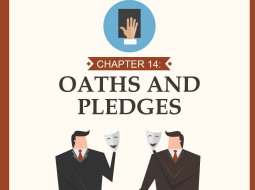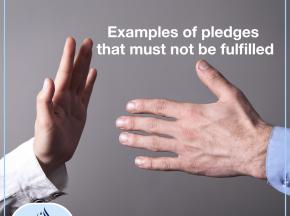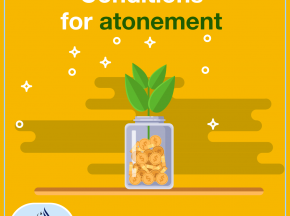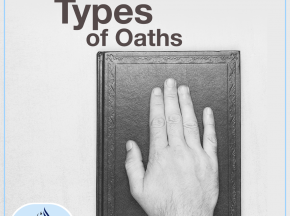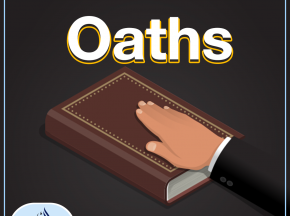content of level
Oaths and Pledges
There are 3 kinds of oaths: Idle oaths which are not accountable, confirmed ones which are accountable, and false oaths which are cardinal sins and cannot be atoned for.
Pledges
A Nadhr is a pledge to do something for God’s sake, a Muslim is encouraged to do good deeds without making pledges, but if he makes a Nadhr he must fulfil his commitment.
Oaths and Pledges
There are 3 kinds of oaths: Idle oaths which are not accountable, confirmed ones which are accountable, and false oaths which are cardinal sins and cannot be atoned for.
Examples of pledges that must not be fulfilled
A man may vow that he would drink wine, or a woman may pledge that she would fast when she is in the period. These are forbidden actions and such pledges must be ignored and never fulfilled.
Types of Pledge
Pledges may be valid or invalid; permissible or forbidden; binding or worthless. A pledge is valid and binding if it involves something good, such as a voluntary act of worship, with the pledging person hoping to earn Allah’s pleasure.
Conditions for atonement
It must be a valid oath, intended by the swearer for something to happen. The oath is not valid unless sworn by Allah, or one of His names or attributes.
Atonement for oaths
Allah, in His mercy, has made clear a way to go back on one’s oath and release oneself from its import. Allah says: ‘Allah has already ordained for you [believers] a way to release you from such oaths’ (66: 2).
Types of Oaths
Idle oath: This is when a person says the words of an oath without intending his statement as an oath. He may say, for example, ‘Yes, by Allah’, or ‘No, by Allah’.
Oaths
An oath is made to confirm something by Allah’s name or one of His attributes. Oaths may be classified into three categories with respect to their validity and commitment.
Learn Fiqh with Al-Hakeem | Atonement for oaths
In this Lecture, Sh. Assim Al-Hakeem discusses and explains the Atonement for oaths.
Learn Fiqh with Al-Hakeem | Oaths and Pledges
In this Lecture, Sh. Assim Al-Hakeem discusses and explains the Oaths and Pledges.
Can we swear or take an oath on Quran by placing our hand or by words?
Can we swear or take an oath on Quran by placing our hand or by words? - Assim al hakeem
Examples of pledges that must not be fulfilled
Any pledge to do something forbidden must not be fulfilled, such as pledging oneself to drink wine, making pledges to dead people or making pledges to glorify a grave or an object.
Pledges
A Nadhr is a pledge to do something for God’s sake, a Muslim is encouraged to do good deeds without making pledges, but if he makes a Nadhr he must fulfil his commitment.
Conditions for atonement
The atonement of an unfulfilled oath is a must if it is a valid one, done deliberately and the swearer did not do what he swore to do, provided that he did not make an exception.
Atonement for oaths
Atonement for oaths can be done by feeding 10 poor people, giving each of the 10 people a garment, or to set a slave free. If not attainable, the swearer should fast for 3 days.
Oaths and Pledges
There are 3 kinds of oaths: Idle oaths which are not accountable, confirmed ones which are accountable, and false oaths which are cardinal sins and cannot be atoned for.

